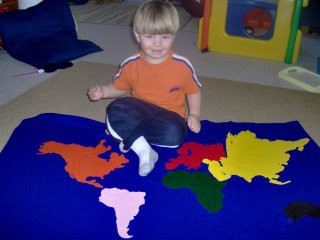We use a lot of Montessori materials in our homeschool and my little guy, ML (2), has really taken to the geography materials! I thought I might describe some of the things he uses which others might find useful during summer vacation with their children.
I love doing geography with my children because they make so many connections with the information they learn. It's so easy for NJ (6) to relate a location in a book we're reading with a place on a map or the globe. If it's a place he's not familiar with, we look it up. We're making this into a habit so it will become second nature.
The first thing I offered to ML was a continents globe - I painted an old 6" globe so that each continent was a different color. The result is a very simple representation of the earth - no text, no country divisions, just continents and blue for the ocean. Then we discussed a few things known to ML about each continent - we live here, here's where Oma and Opa live, here's where
Felix went when he visited the kangaroos, etc.
Then I made a
felt continents map. This is a large blue piece of felt for the ocean with each continent cut out of stiffened felt in it's appropriate color to match the continents globe. ML and I "build" the world map together. He loves this! He's so proud that he knows where he lives and his little tongue gets tied up when pronouncing "Nord-Amerika" and "Europa." And since he loves this game, he really remembers what he's learned! We also take different plastic animals and put them on the map according to where they live - alligators in Florida, elephants in Africa and India, etc. This is also a huge hit. Who knew learning could be such fun?!
My next big splurge will be a wooden puzzle map of Europe - Allison's Montessori has
beautiful ones - and ML loves puzzles. This will be a great opportunity to learn the names and locations of the countries and again put our favorite storybook characters into perspective.
Also,
Enchanted Learning has lots of coloring pages which are great for geography - I have managed to pull up an outline map of the Caribbean within 30 seconds! NJ has taken to coloring maps, flags, and state crests. They also have many
printables in German which can help save a rainy summer afternoon.








